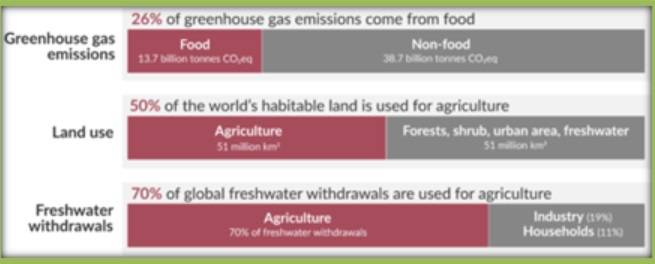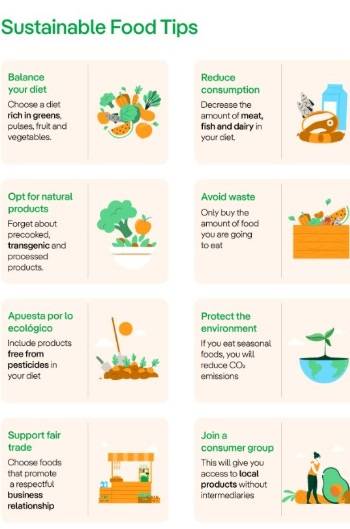Food Sustainability: Balancing Environmental Impact, Food Security, and Health, by Chef Manoj Shah
Food sustainability refers to the method of food preparation and distribution that protects the environment by efficiently using natural resources. It is aimed at producing enough food to serve human population (Morawicki and Díaz, 2018). According to the United Nations estimates, the food industry is responsible for a global energy consumption of 30% and with the rise in population, there is a need for 60% more food (Iberdrola, 2024). However, the current food system is associated with the consumption of animal products and refined grains and sugars that impact human health. This underscores the need for food systems that emphasize reduction of environmental impact and creation of a system that can ensure food security, health, as well as economic well-being.
Modern food production has substantial environmental consequences. It contributes to 26% of global greenhouse gas emissions and about half of the world’s habitable land is utilized for agricultural purposes in addition to consumption of 70% of worldwide freshwater reserves (Ritchie, Roser and Rosado, 2022). Industrial farming practices are also dependent on use of chemicals such as pesticides and fertilizers which are responsible for degradation of soil quality and contributing to polluting water bodies. Animal agriculture is a contributor of 65% of world's nitrous oxide emissions which impacts 296 times more than carbon dioxide (Conzachi, 2022).
Additionally, the global food supply chain requires large amounts of energy where processing, transportation, as well as packaging require extensive fossil fuels. Food waste is another critical issue with 1 billion meals wasted in a day across all continents while still 783 million people are affected by hunger (UNEP, 2024). This food wastage represents lost resources. This shows that sustainable food systems are essential to mitigate environmental damage.
In order to achieve food sustainability, a multifaceted approach is required. One of the strategies is adopting environmentally friendly agricultural practices. Organic farming practices have low environmental impacts as they avoid the use of synthetic pesticides and fertilisers (Hill, 2024). Furthermore, the use of recyclable and compostable packaging helps to reduce harmful plastic pollution and decrease carbon emissions. The environmental impact of more processed food is greater and the food loses its nutritional quality. Thus, minimising the amount of processed food consumption enhances food sustainability.
Achieving food sustainability requires a multifaceted approach encompassing environmental, social, as well as economic considerations. Reducing food wastage, shifting to plant-based diets, and supporting local and organic products can contribute to a sustainable food system. Educating customers regarding the impact of their food choices is also an essential aspect of food sustainability. Therefore, the collaborative efforts of businesses and individuals will build an environmentally responsible food system. Taking appropriate actions can pave the way towards a more sustainable future.
The article is authored by Chef Manoj Shah, Vedatya Institute

News & Updates
- Social Responsibility
- BHM (Bachelor of Hotel Management)
- B Des (Bachelor of Design)
- BSc
- B.A (Bachelor of Arts)
- BCT & CA (Bachelor of Catering Technology and Culinary Arts)
- BBA (Bachelor of Business Administration)
- Hospitality & Travel
- Business & Management Study
- Design
- Mass Communication & Media
- Humanities & Social Sciences
- Arts ( Fine / Visual / Performing )
- IT Software Courses
- Top Colleges Colleges in Delhi/NCR
- Top Mass Communication Colleges in Delhi/NCR
- Top Private Fashion Design Colleges in Delhi/NCR
- Top Hospitality Management Colleges in Delhi/NCR
- Top Skill University Colleges in Delhi/NCR
- Top NIFTs Colleges in Delhi/NCR
- Top Hotel Management Colleges in Delhi/NCR
- Top BBA Colleges in Delhi/NCR
- B.Des colleges in Gurgaon
- B.A. colleges in Gurgaon
- Certificate colleges in Gurgaon
- B.Sc. colleges in Gurgaon
- BHM colleges in Gurgaon
- BBA colleges in Gurgaon
- After 10th Diploma colleges in Gurgaon
- BCT & CA colleges in Gurgaon
- Hospitality & Travel colleges in Gurgaon
- Design colleges in Gurgaon
- Business & Management Studies colleges in Gurgaon
- Humanities & Social Sciences colleges in Gurgaon
- Mass Communication & Media colleges in Gurgaon
- IT & Software colleges in Gurgaon
- Arts ( Fine / Visual / Performing ) colleges in Gurgaon
Contact Details
Address
C/O Umak Educational Trust
Garhi Murli (Garhi Bazidpur),
Sohna Road
Gurgaon ( Haryana)
Get details of Similar Colleges
Student Forum
Answered a year ago
As per the latest report, the highest package offered to Hotel Management and Culinary Arts students during Vedatya Institute placements 2023 was over INR 30,000 per month. The average package offered was around INR 25,000 per month. The top recruiters of Vedatya Institute in 2023 included The Ober
Answered a year ago
As per the latest report, the highest package offered to Hotel Management and Culinary Arts students during Vedatya Institute placements 2023 was over INR 30,000 per month. The following image showcases the salary offered at Vedatya Institute placements over the past few years:
Image source: official
Answered a year ago
The following is a list of a few top companies that were a part of the recent placement drive at Vedatya Institute:
Vedatya Institute Top recruiters | ||
|---|---|---|
Taj Hotel | The Oberoi | The Westin |
InterContinental Hotels Group (IHG) | Radisson Blu | JW Marriott |
ITC Hotels | Le Meridien | Neemrana Hotels |
Answered a year ago
Yes, the BDes course is available at Vedatya Institute. The institute offers BDes courses at the UG level. Candidate must meet the eligibility criteria to enrol for BDes course admission set by the college. Aspirants must pass Class 12 with a minimum of 50% aggregate. VI admission process is aptitud
Answered a year ago
Bachelor of Design, a UG degree programme offered for specialisations like Fashion Design, Interior Design, Accessory Design, Textile Design, and much more. Stduents can check some of the reasons to pursue BDes course from Vedatya Institute:
- The course will help the students upgrade their abilities a
Answered a year ago
Candidates who are looking for BA course admission at Manikam Ramaswami College of Arts and Science must pass Class 12 with a 50% aggregate. BA is one of the most sought-after courses in India. BA course is usually provided under the Arts & Humanities streams and can be completed in 3 years. The can
Answered a year ago
The institute offers courses, such as BDes, BSc, BPharma, etc., at the UG level. Apart from the UG courses, the institute also offers a Post-Graduate Programme in Revenue Management (online), diploma, and certificate courses. Students can check some of the course streams from the points mentioned be
Answered a year ago
Vedatya Institute admissions are currently open for various courses. Candidates are selected for courses based on their entrance exam scores followed by PI. Aspirants can apply online on the official website of the institute. The institute offers courses, such as BDes, BSc, BPharma, etc., at the UG









